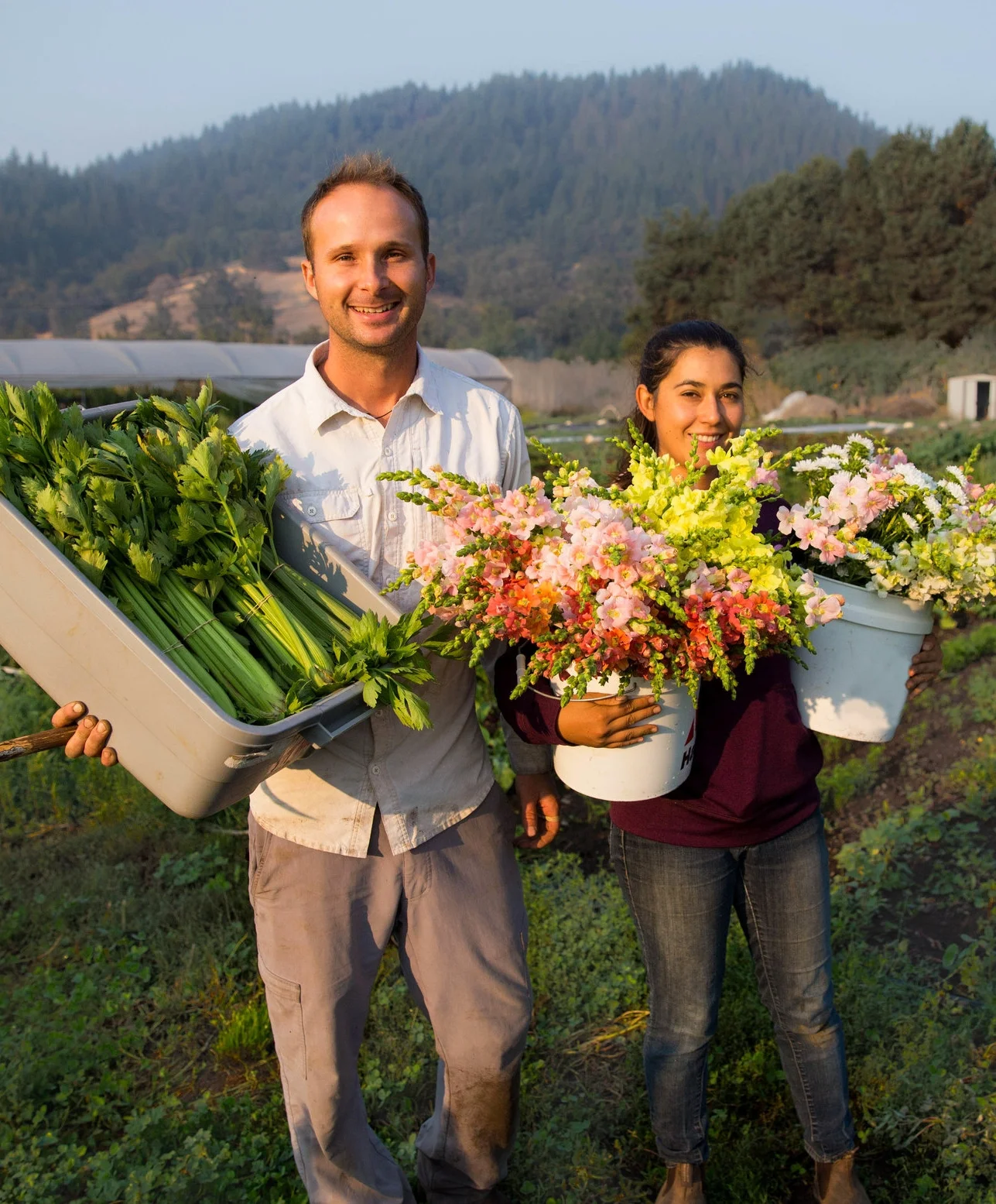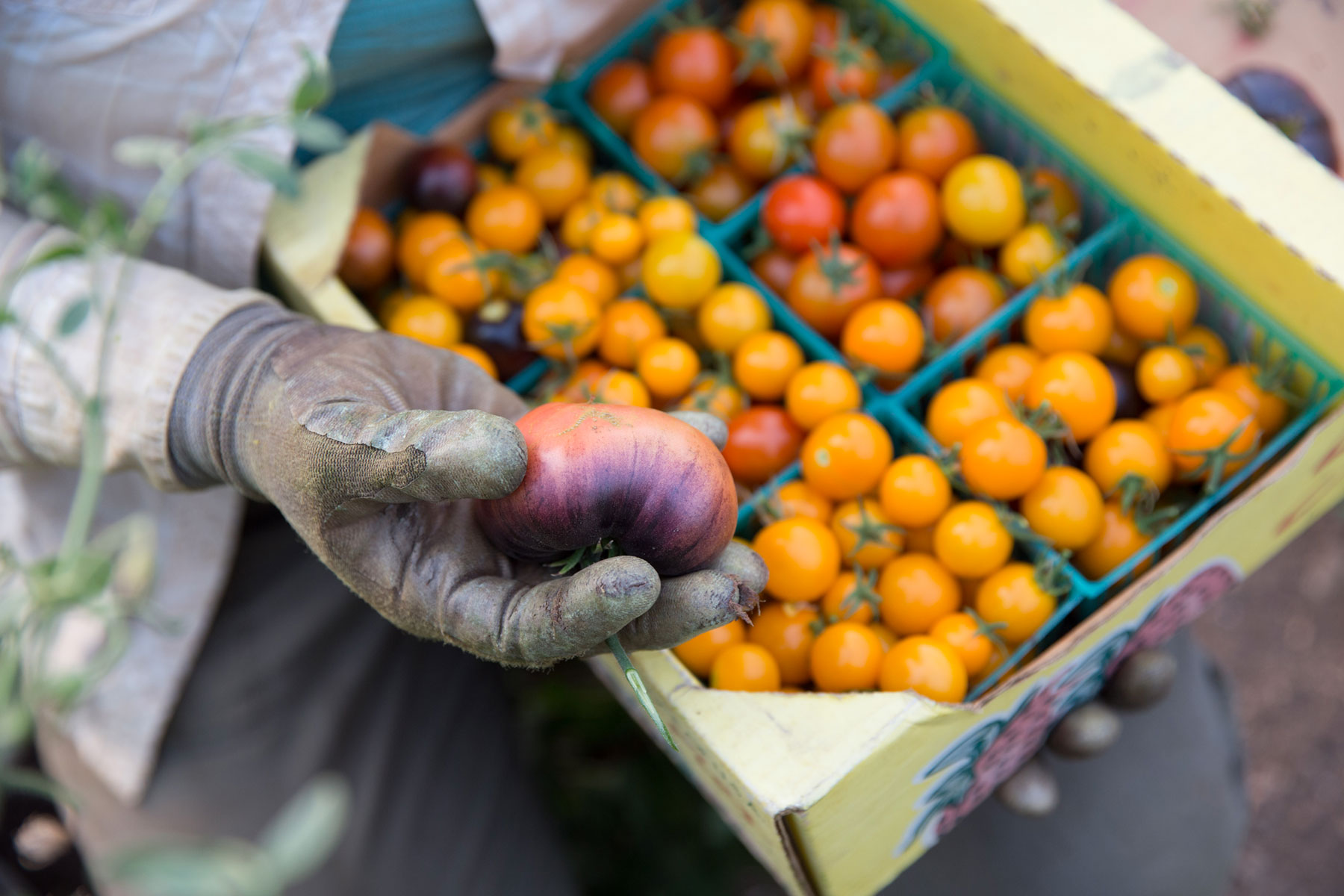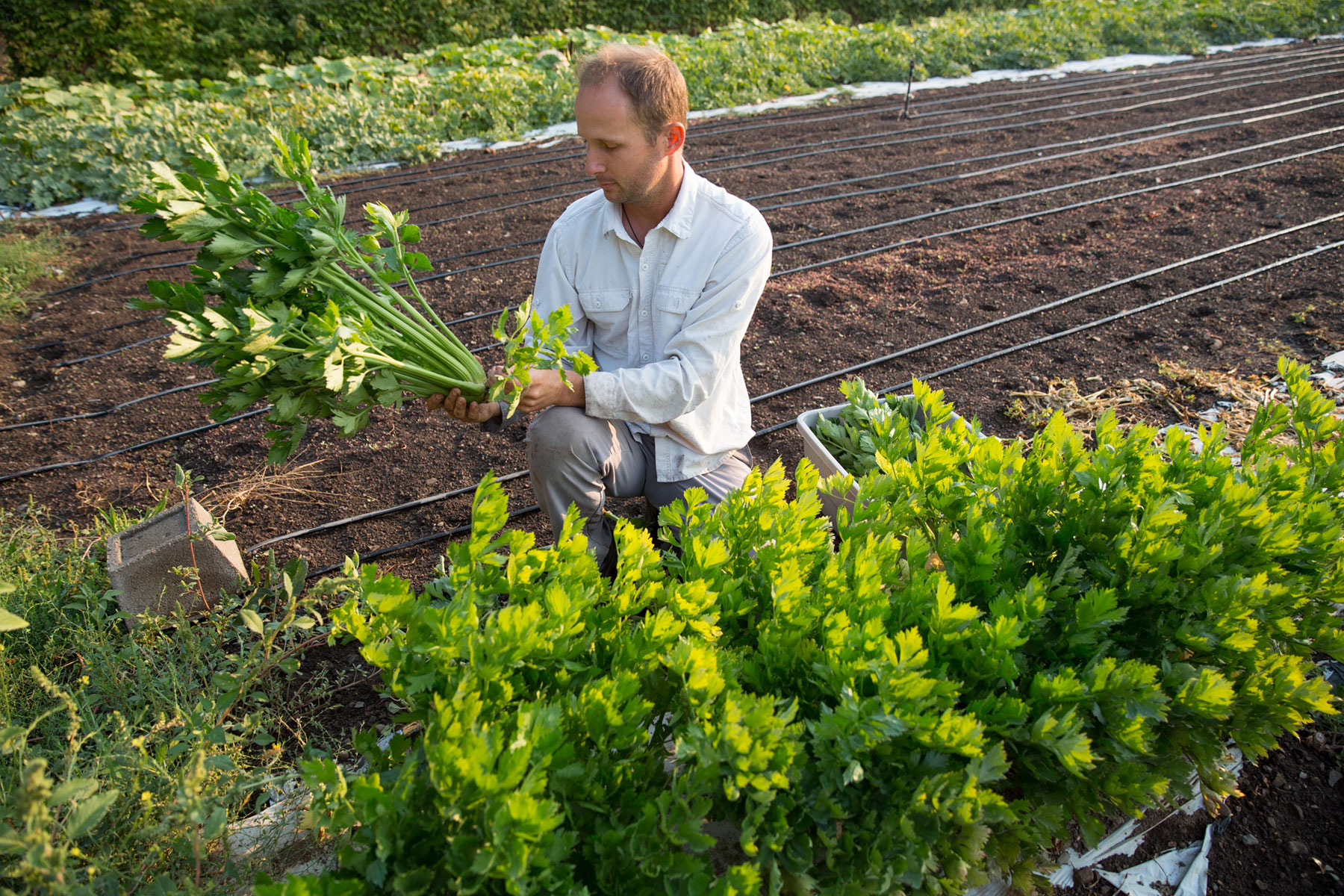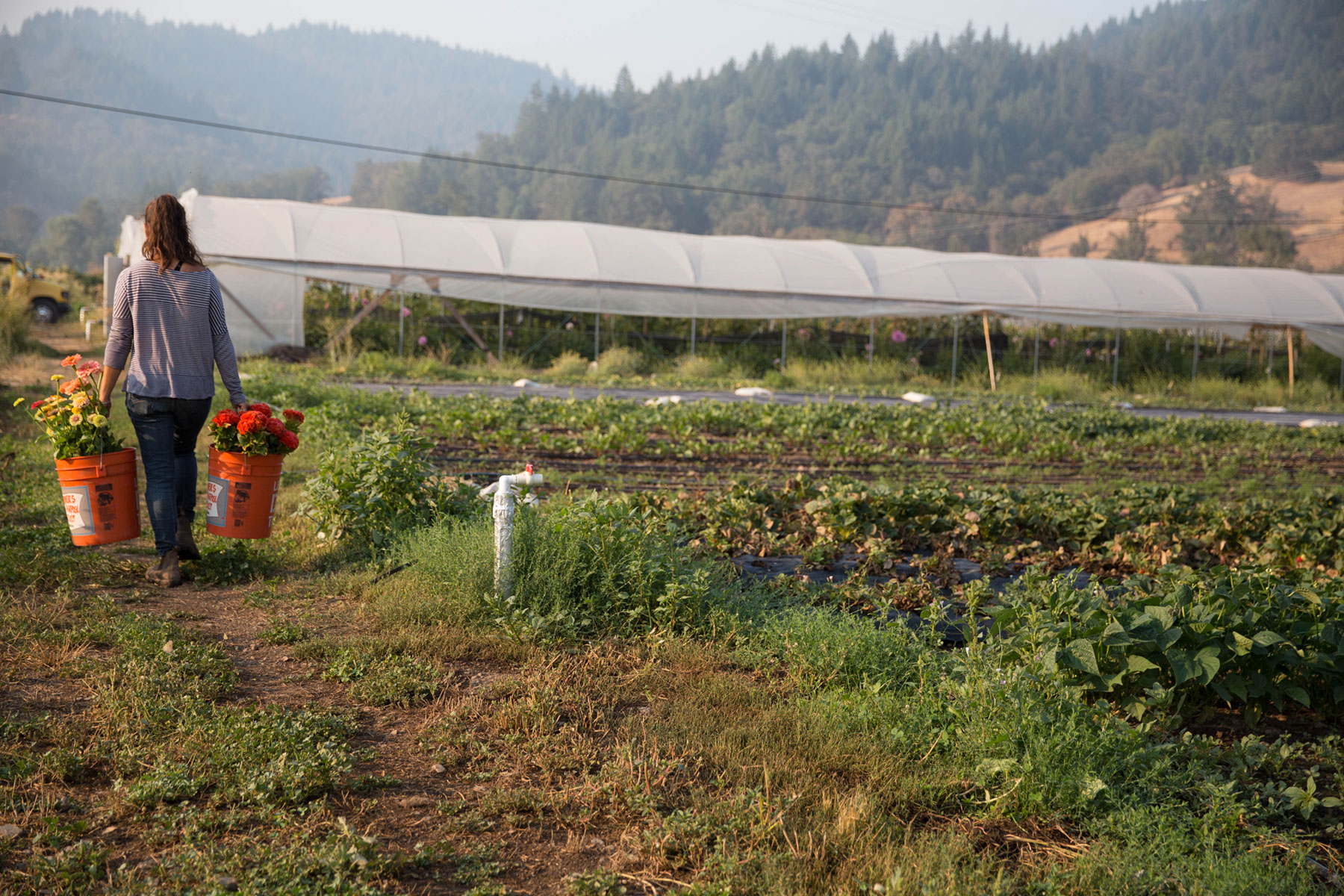Tequio Farm

Growing Strong with Community
by Holly Madrigal
photos by Ree Slocum
Ridgewood Ranch is nestled in a verdant valley just south of Willits. As you wind down the slope towards Tequio Farm, you might pass a herd of white deer (a gift to the previous owners from William Randolph Hearst), or the happy cows of the Church of the Golden Rule, or Seabiscuit’s historic stud barn. This is an idyllic place a stone’s throw from Highway 101, but it feels a world away.
According to Isa Quiroz, tequio means “collective work for shared benefit.” And the couple that founded Tequio Farm has cultivated and come to rely on that here. Hunter Flynn and Isabel Quiroz came together from very different backgrounds. Hunter’s family was severely impacted by the great recession of 2008, and his younger brother began cooking primarily plant-based meals to save money. A student of economics and business, Hunter began to recognize that the business practices being taught had brought on the financial crisis. An encounter with a garden manager in the Bay Area introduced him to the non-profit Ecology Action, initially at their garden in Palo Alto and then with an internship at the research mini-farm on Pine Mountain in Willits, and he felt drawn to this way of life.
Isa’s hometown is Aguas Calientes in Mexico. As she studied environmental science, she became interested in social justice as it related to access to land, farming, water rights. She did not have access to farmland, so she founded a company, with friends Augustine and Marisol, which brings biointensive farming methods to troubled neighborhoods. Although the company does non-profit work, forming it as a for-profit was easier to get off the ground.
Isa explains that when you are working in gang-ridden, low employment areas, you want people to get involved. You want everyone to participate, to get digging. “With the Biointensive method, you also see results very quickly, which is satisfying,” she adds. Augustine and Marisol encouraged Isa to travel to the US to take the biointensive internship in Willits. She and Hunter met in the library at Ecology Action. “She gave me purple glittery sunscreen to wear and didn’t tell me that I sparkled! It was my first day in class!” Hunter complains. “Everyone loved it!” Isa laughs, their love for each other clearly visible in their smiling faces.
Tequio was originally going to be in Mexico. Isa’s job was going well. She was saving some money that they could use to buy some land, but the work was really stressful. Hunter would come to visit for a bit and see Isa working morning until night in very dangerous neighborhoods where murders were common. So when Ellen at the Golden Rule Garden at Ridgewood Ranch suggested they lease a section of land there, it made their start easier. The Golden Rule Garden had fencing, water and some infrastructure in place, and Isa and Hunter knew a number of the interns and had friends who lived there. Hunter had completed his work at Ecology Action and was studying John Martin Fortier and Curtis Stone’s work on small-scale, financially sustainable farms. “We couldn’t have a farm if it could not sustain us,” Hunter adds.
They began Tequio Farm in 2015 and haven’t looked back. And it has been hard, really hard. “The last few years have been some of the most challenging years of my life, I can say. Last year was this nice transition where we went from 100% survival mode to 50% survival mode and starting to see the light at the end of the tunnel,” Hunter adds. And “We have tools!” adds Isa, which they both are willing to try if it will save them time and money. “It’s because we were desperate!” Isa laughs. “Last year they had to wheel me into the ER because I couldn’t walk after planting all of our strawberries! They are so hard on the body.”
The couple reached a financial goal they had set for themselves, but they were aware that they were sacrificing in other areas of their lives to make it all happen. “I thought, yes, we met this target but at what cost?” mentions Hunter. “We’re so exhausted, and we don’t have any friends, we’re grumpy with each other. It was hard.” They traveled to Mexico in the off season and evaluated things. They decided that they had to find a balance between making a living and living their lives. Using a fair amount of their savings, they bought some key infrastructure to help on the farm, and they turned to the community to help finance other needs.
They were the first farm to get a loan from the Ukiah Co-Op, which they used to buy a small, walk-behind BCS Tractor. “That piece of equipment has been a game changer,” Hunter explains. “As we try to move toward a no-till process, this machine stirs just the top 1½ inches, preparing a nice smooth bed for planting.” The Co-op has been incredible, really, really important for us. And we bought a Japanese Paper-Pot Transplanter,” Hunter explains, which “allows us to start seeds in an efficient manner, but it also allows us to transplant 256 plants per minute without me having to bend over. It has saved my back this year.” The Good Farm Fund has helped them with a couple of grants over the years, most recently used to build a propagation greenhouse. And a local group, the Grateful Gleaners, has partnered with them to build a produce cleaning shed.
Being in this place has provided connections, and the community of Willits and Ridgewood Ranch has embraced them. A couple years ago a sudden, fierce rainstorm destroyed their greenhouse along with countless plants. “We were going to quit at that point,” Isa remembers, “and the community was like, no, we need you.” So the community created a fundraising account to build them another greenhouse. “The ecosystem of this ranch is really special and unique,” Hunter adds. There are four or five other farm enterprises happening here at Ridgewood Ranch. The space allows for collaboration. And the internet, Instagram and YouTube have been unexpected lifelines, allowing Hunter and Isa to reach across geography and form friendships and mentorships across the globe.
When reflecting on the future, Hunter says, “I feel like we’re moving in a really cool direction. I feel like we could make more money, not work as much, and have better quality produce.” The farm is bursting with Purple Tomatoes, Triple Crown black berries, and peppers. They sell strawberries and raspberries and a huge selection of produce. “When we started, we were really inexperienced at being a production farm. So for the first years, for me, it was just so hard. Plus moving to a new country, learning the language and all of that, I didn’t see the end of the tunnel.” Isa would ask herself, “Am I never going to have an income? Am I going to live in poverty forever? Will I not be able to have a house or family or retirement? This year has shown me that there is another way.” Hunter chimes in, “If we are happier and healthier, our garden is reflecting that. We have been able to make life enjoyable again.”
The Ukiah Co-Op, Harvest Market, the Mendo Lake Food Hub, The Brewing Company, and Crush are the biggest buyers of Tequio Farm’s produce. Hunter and Isa have gone into Crush and peeked at the surrounding tables, giddy because people are eating their Tequio Farm salad. You can find Tequio regularly at Farmers Markets in Ukiah and Fort Bragg.



